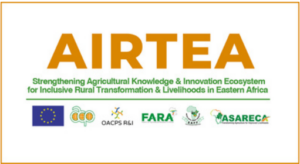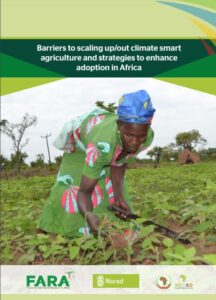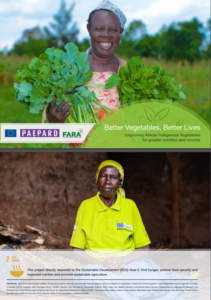Kwaku Antwi leads the Research, Policy, and Investment Cluster at the Forum for Agricultural Research in Africa (FARA). He also leads the AIRTEA Project which is being implemented in partnership with ASARECA and EAFF and supported by the ACP Innovation Fund. This project aims to accelerate the transition toward resilient and sustainable food systems by strengthening science, innovation, and agribusiness linkages along agricultural commodity value chains in Kenya, Rwanda and Uganda. Prior to this, he worked for about ten years with the Government of Ghana as a policy and monitoring evaluation expert. He has worked extensively in the field of African food systems in relation to climate change, looking at how they influence each other.
Could you remind us what are the major threats posed by climate change to food systems in Africa?
We have the issue of low productivity of crops, livestock and aquaculture that has led to a lot of food insecurity. Currently, we estimate about 300 million being food insecure on the continent. There has been an extinction of some nutritious and indigenous crops, unable to withstand the vagaries of bad weather. It is a pity because most of them are the crops that Africa could have relied on to address food insecurity and malnutrition. There has been an increase in food prices over the past two years, due to the fact that little has been produced. Climate change has effects on poverty because a large part of the population is into agriculture and it threatens their very basic livelihoods. Socially, there has been some kind of overpopulation in the major cities in Africa because of mass migration from the rural areas to the cities, particularly by the youth. And when people lose their livelihoods, they are idle and can find themselves being engaged in conflicts.
What solutions can R&I provide to make food systems more climate-resilient and sustainable?
The former president of Nigeria, Olusegun Obasanjo once said that ‘without research and innovation, agriculture can be a car without an engine. Research and innovation can contribute to building food systems that meet fundamental human rights, whilst ensuring that we do not go beyond the boundaries of sustainable agriculture. They can contribute for example to maintaining soil fertility, and desalinating seawater for irrigation purposes, as most countries in Africa have access to the sea. In terms of livestock and aquaculture, a source of greenhouse gases, R&I can help to increase production while reducing their environmental footprints. We can have crops and animals produced through biotechnology that can withstand the effects of climate change. Mobile technology can overcome some barriers to production. We can improve human nutrition with food fortified with vitamin E and other nutrients.
In the face of climate urgency, R&I needs to be deployed at a faster pace, on a larger scale, at a lower cost, and with greater impact. What are the main obstacles to such rapid deployment?
There are quite a number of challenges. The first one has to do with investments in research and innovation. Currently, most African governments spend less than 1% of their annual expenditure on research and innovation, which is woefully inadequate. African governments must be held accountable by the African Union because, in the Malabo declaration by the African Union, African governments are not expected to spend less than 1% of the annual expenditure on research and innovation. There are also weak linkages between researchers and policymakers, and between researchers, extension officers and farmers- which limits farmers’ access to research outputs. Let me also talk about the number of researchers on the continent which is very inadequate to meet the demands of research. Currently, Africa produces just about 0.7% of all researchers around the world. We need to invest more in building the human capacity for research and innovation. The situation of female researchers is worse and we need to increase their number through affirmative action. We have also a lot of inadequate infrastructure, in terms of labs, apparatus to use in the lab, etc.

How do you intend to address these challenges with the AIRTEA project?
The challenges are so numerous that the AIRTEA project alone cannot handle all challenges. But in our own small way, we try to address some of the challenges. I spoke of low investments in research and innovation. Under the AIRTEA project, we are supporting third-party projects and investing in some of their R&I activities. We help them to renovate greenhouses where improved seedlings are grown or produced, or buy equipment to be used in labs. We are also promoting a multi-stakeholder approach, by creating strategic and operational innovation platforms including all the actors that matter on the agricultural value chain (researchers, farmers, extension agents, policymakers). These platforms create an avenue for them to work together more efficiently.

Young people and women are priority targets for the AIRTEA project. Why is it so important to include them in the innovation ecosystem?
Youth represent more than 56% of the African population. Wherever there is conflict, you find out that most of the people who are engaged in it are the youth. The idea of AIRTEA is to bring them on board to show them that agriculture can be profitable. Women all over are considered one of the most vulnerable people in society. And the situation is worse in Africa, because of many factors including lack of access to land and other resources. Research has shown actually that if women are empowered and able to come out from their economic woes, households become more food secure. And so we think that if we are able to support and empower them, then the whole society benefits.
Interlinking climate change with the water, food, energy, ecosystems nexus is increasingly recognised as crucial for implementing effective adaptation strategies to climate change. What are the biggest gaps, according to you, in scientific knowledge related to this nexus?
What comes to my mind immediately is data. We don’t have available data that enhances the linkage between water, food and energy, especially here in Africa. There is little data on the amount of groundwater systems we have. The amount of water that we have for irrigation purposes. Water quality has also been declining on the continent because of a lot of practices, some of which even come from agriculture. This quality is unknown because it’s not being tested. Most countries do not have water management treatment plants. I can also think of insufficient availability of harmonized databases in order to exchange more easily knowledge. When we talk of that nexus, we are quick to look at water, but most of the time we forget that agriculture is also an area that produces and uses energy. So it’s important that these weaknesses are brought up so that they can be addressed appropriately.

Does FARA promote this nexus approach? And if so, what are the expected benefits and the main challenges for it to be successful?
FARA promotes such an approach, because if it’s looked at critically and given all the necessary importance it needs, it can help support food systems, providing social, economic and geopolitical benefits. We can improve resilience in the face of climate change (by reducing the incidence of droughts and flood, and increasing efficiencies in the consumption of resources), public health (notably by reducing water pollution and waterborne diseases), conservation and recovery of critical ecosystems and habitats. On the geopolitical aspects, we envisage a situation where there will be a common protocol in terms of managing these resources across the continent. There are challenges associated with every process and what comes first to my mind is policy issues. Every country has its own policy. And so getting policymakers to understand and internalise this into their own political frame becomes an issue, as the understanding of that nexus is not forthcoming on the continent.
How much emphasis does FARA put on nature-based solutions in its research programmes?
FARA puts a high emphasis on nature-based solutions. We promote what we call climate-smart agriculture, working more towards agroecology. The main idea behind it is that we don’t want to increase productivity or production to the detriment of nature.
What could be the most interesting sectors to engage in for researchers and innovators in Africa in relation to food systems and climate change?
Many areas. I can talk of gender and youth. Innovators and researchers can produce solutions that are easily adopted and taken up by women and youth. Building capacity of researchers, women researchers in particular, through exchange programmes or any other approach is also very important. Research in investments is another area that can be looked at to ensure that the amount of expected investment gets into research and innovation in the fight against climate change. Research in policy is also important, so that we can come up with innovative ways that would see the support of policymakers.

Why is it important to value indigenous knowledge if we want to achieve more climate-resilient food systems?
Yes, it is important because indigenous knowledge is the building blocks on which research or new ideas come up. Indigenous knowledge promotes local adaptation or strategies. It also provides or promotes environmental conservation. And it promotes sustainable social relationships between animals, plants, and human beings in the ecosystem. So to create a conducive ecosystem and promote resilience, we need to value indigenous knowledge in moving forward.
Do you have specific programmes that combine modern science and Indigenous knowledge systems?
Right now, we are coming up with a compendium of Indigenous food or indigenous crops on the continent, especially indigenous vegetables. One is because of their high nutrient levels. Two, because these crops are produced mostly by women. As most of them are becoming extinct, we are also looking at how we can conserve their germplasm by using modern scientific approaches.
What else would you like to add to our conversation related to climate change and food systems in Africa?
Climate change is real, and its effects are also real. Therefore, it is time that African leaders come together to think more about strategies and their effective implementation. We want to see increased investments in our food systems. We want to see the promotion of research and innovations to combat the effects of climate change. Because whether we like it or not, it is here with us and we are facing the brunt of it.
